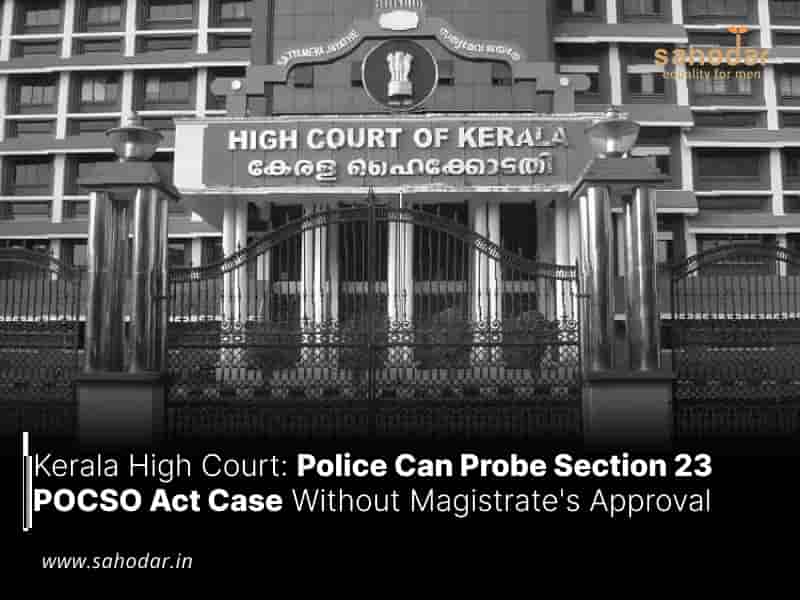A Division Bench of the Supreme Court had delivered a split opinion on this issue in 2022. Section 23 of the POCSO Act deals with the offence of revealing a minor victim’s identity.
The Kerala High Court recently observed that police can investigate cases involving the disclosure of a minor sexual assault victim’s identity under Section 23 of the Protection of Children from Sexual Offences Act, 2012 (POCSO Act) without requiring prior approval from a magistrate.
Typically, serious crimes categorized as cognizable offences can be investigated without such approval, whereas non-cognizable offences require magistrate approval before registration and investigation.
Justice A Badharudeen noted that the POCSO Act does not distinguish its offences as cognizable or non-cognizable. Based on this, he concluded that an offence under Section 23 of the Act can be considered cognizable, allowing the police to investigate it without first obtaining a magistrate’s approval.
“In the POCSO Act, there is no classification as to cognizable or non- cognizable offences and reading Section 33, there is no specific bar for the police officer to investigate a crime suo motu, where Section 155(2) of Cr.P.C. has no application. In such view of the matter, I am of the view that the offence punishable under Section 23 of the POCSO Act to be held as cognizable read along with Sections 33 and 42A of the POCSO Act,” the Court held.
Notably, in the 2022 case of Gangadhar Narayan Nayak vs State of Karnataka, a Division Bench of the Supreme Court delivered a split verdict on this issue.
Justice Indira Banerjee held that Section 155 of the Code of Criminal Procedure (CrPC), which requires magistrate approval for investigating non-cognizable offences, does not apply to Section 23 of the POCSO Act.
In contrast, Justice JK Maheshwari took the opposite view, stating that Section 23 should be treated as a non-cognizable offence, making magistrate approval necessary for investigation as per Section 155 of the CrPC (now replaced by BNSS).
The Kerala High Court noted that the Supreme Court has yet to make a final ruling on this matter, as it has been referred to a larger Bench.
“The larger Bench’s decision on this issue will be conclusive,” Justice Badharudeen stated.
However, he emphasized the need for a logical resolution in the case before him. Accordingly, he examined the issue in light of the specific facts and circumstances of the case and ultimately aligned with the view expressed by Justice Banerjee.
The High Court issued its ruling while rejecting a plea to quash charges under Section 23 of the POCSO Act against two individuals accused of uploading a video on the YouTube channel i2i news, alleging that a child artist from the Malayalam film Aami was sexually exploited.
The child’s father filed a complaint, claiming that the accused had violated the child’s privacy and tarnished their reputation by revealing details that led to their identification.
Following the filing of a chargesheet against the accused, they approached the High Court seeking to have the case dismissed.
The accused contended that the charges against them were for non-cognizable offences and, therefore, could not have been investigated without prior approval from a magistrate.
They were charged under Section 23 of the POCSO Act and Section 74 of the Juvenile Justice (Care and Protection of Children) Act, 2015 (JJ Act).
Section 74 of the JJ Act prohibits the media from disclosing any details—such as the name, address, or school—that could reveal the identity of a child in conflict with the law, a child witness, or a child in need of care and protection while reporting on any inquiry, investigation, or judicial proceeding.
The Court declined to quash the Section 23 POCSO Act charge, holding that it was a cognizable offence that police could investigate without requiring a magistrate’s approval.
It further stated that, based on the available allegations and evidence, a prima facie case against the accused under Section 23 of the POCSO Act could not be ruled out at this stage.
However, the Court quashed the charge under Section 74 of the JJ Act.
It reasoned that this provision specifically penalizes the disclosure of a child’s identity in the context of an inquiry, investigation, or judicial proceeding, whereas the disclosure made in the accused’s video was more general in nature.
“In the instant case, the disclosure is purely general and not made during any enquiry, investigation and judicial procedure and, therefore, the offence under Section 74 of the JJ Act would not attract, prima facie,” the Court said.
Accordingly, the Court partially allowed the accused’s plea by quashing the charge under Section 74 of the JJ Act, while allowing the criminal proceedings under Section 23 of the POCSO Act to continue.
The accused were represented by advocates Sooraj T Elenjickal, Helen P A, Stephanie Sharon, and Athul Roy.
Public Prosecutor Jibu TS appeared on behalf of the State.

